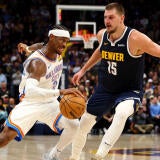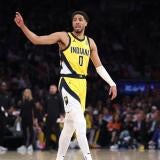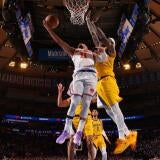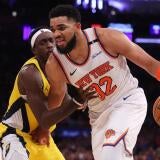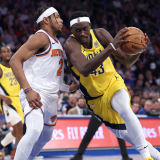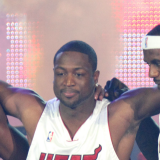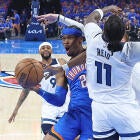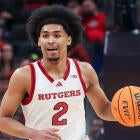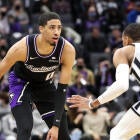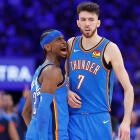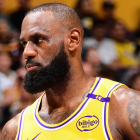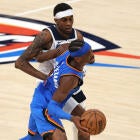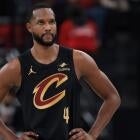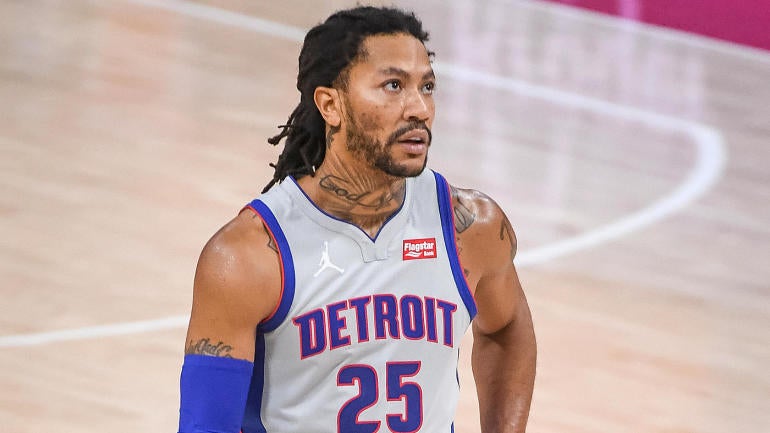
Tom Thibodeau's rotation has been a subject of much consternation so far this season. According to the Knicks' coach, playing time is "based on performance. You play well, you play more." It's just that Thibodeau's performance rubric tends to slant toward veterans, and it has since his early days in Chicago. If a young Jimmy Butler couldn't crack the starting lineup until midway through his second season, what chance does Immanuel Quickley have?
Apparently, not much of one. New York's star rookie has outperformed veteran starter Elfrid Payton on virtually every front so far this season, yet has averaged only around 14 minutes across New York's past three games. Now, he'll have to fight even harder for a smaller slice of the point guard pie. The Knicks made a trade to acquire longtime Thibodeau favorite Derrick Rose, a move intended to juice their 25th-ranked offense, but at a cost far greater than the second-round pick they surrendered to complete the deal.
After all, Thibodeau's opinion of Rose's performance the last time the two collaborated must have been quite high if that was the sole determinant of his playing time. Prior to Thibodeau's dismissal in Minnesota, he played Rose just under 30 minutes per game during the 2017-18 season. Under Ryan Saunders, Rose played closer to 23 minutes per night as youngsters like Tyus Jones saw their roles increase in what amounted to a rebuilding season.
Their hot start has somewhat obscured it, but that is New York's reality at the moment. The Knicks have one of the NBA's youngest rosters, and developing it for the sake of long-term contention should be a higher priority than fast-forwarding it into immediate competence. A playoff appearance should be viewed as the cherry on top of a successful season of internal improvement, not an endpoint for which that improvement can be sacrificed.
Rose's addition risks that improvement. Even if his role in New York is identical to the one he held with the Pistons, the Knicks suddenly have 22.8 extra minutes and 12.3 extra shots per game to build into their rotation. They have to come from somewhere, and while a possible demotion of Austin Rivers would help, the core idea behind this trade is that Rose's shot-making is an improvement upon what already exists on this roster.
It just isn't clear that that's actually the case. The Knicks are currently ranked 13th in isolation efficiency on offense, and their pick-and-roll ball-handlers are ranked 21st, according to Synergy Sports. That's hardly ideal, but for a No. 25-ranked offense, they hardly seem like the problem, either. Where the Knicks need the most help is behind the arc. They take the second-fewest 3-pointers in the NBA (27 per game), and despite a hot start, they've fallen to 24th in 3-point percentage (35.3 percent). Another ball-handler probably isn't the solution to improving those numbers, as one of New York's primary existing scorers struggles off the ball. RJ Barrett is a 29.6 percent catch-and-shoot 3-point shooter. He'd likely appreciate a bit more space to drive rather than more possessions spent as a passive observer on the perimeter.
More shots for Rose likely means fewer for Barrett and Julius Randle, outcomes that a present-focused Knicks team likely needs, but that a rebuilding-oriented organization should view as a negative. Barrett, a former No. 3 overall pick in only his second season, should be handling the ball as often as humanly possible. It's his best chance at getting good enough at doing so to eventually become the star the Knicks need him to be. The Knicks hold a team option on Randle's deal this offseason and will need to decide what sort of investment it is willing to make in his future. He has thrived this season as an offensive initiator, a skillset he'll have fewer opportunities to showcase from this point forward. The addition of yet another point guard likely spells doom for former lottery pick Frank Ntilikina, who played only 42 minutes this season even before the trade.
And then there's Quickley, whose success is an argument against the Rose trade even beyond the minutes he will or will not play. The Knicks were widely criticized for selecting a prospect most viewed as a second-round talent at No. 25 overall. Quickley hasn't just proven those doubters wrong, but he's proven New York's scouting department right. He is a testament to Leon Rose's overhauled organization, one that is capable of finding diamonds in areas where most teams only see rough. The Knicks gave up a potentially very valuable second-round pick from the Charlotte Hornets to make that deal. Such a pick was another chance to find a Quickley-caliber prospect.
Instead, the Knicks have made it harder for the prospect they already have to grow in a rotation that is now overloaded with veterans who don't figure to be part of New York's future. Between Rose, Rivers, Alec Burks and Reggie Bullock, the Knicks now have four guards in their rotation who are either already at least 30 years old or will hit that milestone before they next hit free agency. That's twice as many as the defending champion Lakers, who obviously aren't rebuilding. That group doesn't even include Payton.
If merit was indeed the determining factor in dividing minutes amongst the six of them, Quickley would undoubtedly be starting. He currently leads the Knicks in per-minute scoring, and has done so on a higher true shooting percentage than all Knicks guards except Burks. Burks is also the only existing Knicks guard with a higher net rating on the season. Quickley still leads the team in assist-to-turnover ratio, and while he isn't exactly a lockdown defender, he's improved throughout his rookie season and has excellent tools for his position.
But so far this season, merit hasn't determined roles in New York, and the Rose deal is a concerning indication that it won't be moving forward. Quickley, Barrett and Randle are more than just the likely cornerstones of the next contending Knicks team. They are the most important pillars of this surprisingly competitive one, and adding a volume scorer with Rose's reputation and connection to Thibodeau is only going to make it harder for them to sustain the performances that have put the Knicks in a position to trade for a win-now veteran in the first place.
![[object Object] Logo](https://sportshub.cbsistatic.com/i/2020/04/22/e9ceb731-8b3f-4c60-98fe-090ab66a2997/screen-shot-2020-04-22-at-11-04-56-am.png)



